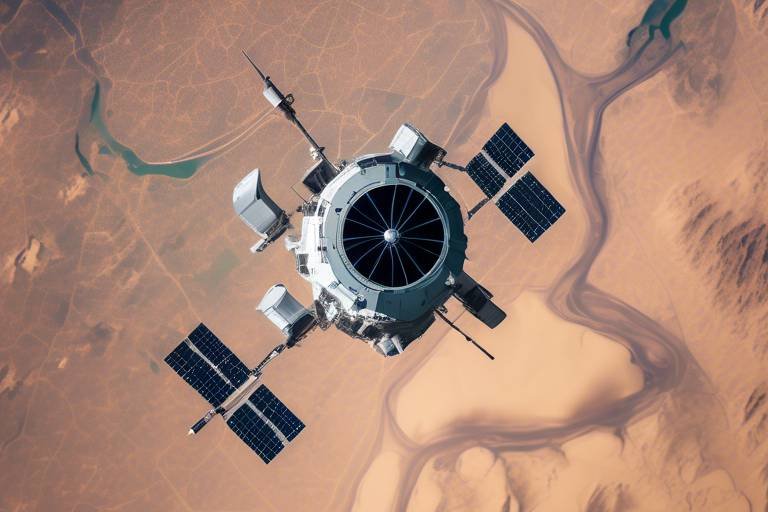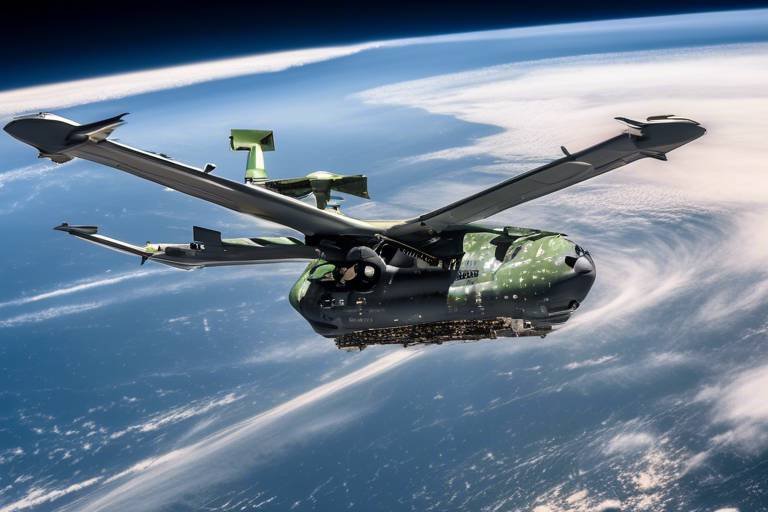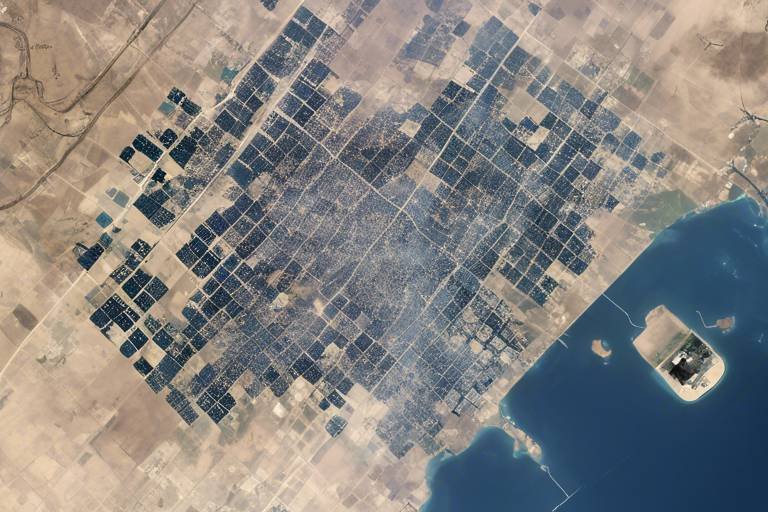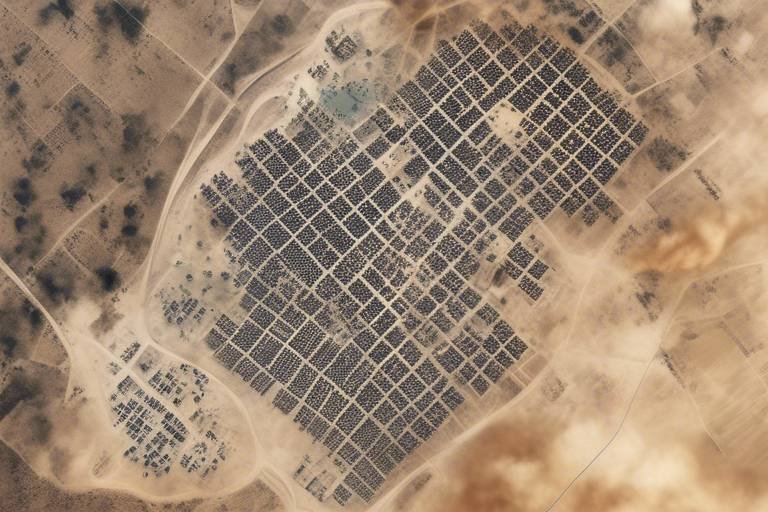The Future of Space-Based Logistics in Defense
In an era where technology is advancing at breakneck speed, the concept of space-based logistics is no longer a distant dream but a tangible reality. Imagine a world where military operations are seamlessly supported by a network of satellites and advanced robotics, ensuring that troops receive the supplies they need, precisely when they need them. This innovative approach is set to revolutionize the way defense organizations operate, enhancing their efficiency and responsiveness in an increasingly complex global landscape.
As we delve into the emerging trends and technologies that are shaping this new frontier, we will uncover the myriad ways in which space logistics is poised to transform military supply chains. From the strategic importance of these advancements to the operational efficiencies they promise, the future of defense logistics is intertwined with the vastness of space.
Are you ready to explore how these developments will impact military operations? Buckle up, because the journey into the future of defense logistics is both exciting and essential for understanding the next generation of military strategy.
The landscape of space logistics is being reshaped by groundbreaking advancements in satellite technology and robotics. These innovations are not just enhancing communication and data transfer; they are fundamentally changing the way supplies are transported and managed in defense operations. For instance, the deployment of small satellites, often referred to as CubeSats, allows for real-time monitoring of supply chains, providing commanders with instant access to critical information.
Moreover, the integration of autonomous drones into logistics operations is a game changer. These drones can deliver supplies to remote locations, reducing the time and resources needed for traditional delivery methods. As a result, military units can maintain operational readiness even in the most challenging environments. The combination of these technologies promises to create a more agile and responsive logistics framework.
Understanding the strategic significance of space logistics is crucial for modern defense. In a world where military engagements can occur anywhere on the globe, the ability to rapidly deploy resources is vital. Space-based logistics not only enhances operational readiness but also supports global military strategies by ensuring that forces are equipped and prepared for any scenario.
Space logistics promises to improve operational efficiency by streamlining supply chains. Traditional logistics often suffer from delays due to various factors such as transportation bottlenecks and communication breakdowns. In contrast, space logistics can significantly reduce these delays through the use of advanced tracking systems and automated delivery mechanisms. Imagine a scenario where a military unit in a remote area can receive essential supplies within hours instead of days—this is the future that space logistics offers.
Implementing space logistics can lead to significant cost savings for military operations. By reducing the need for extensive ground transportation and minimizing delays, defense organizations can allocate their budgets more effectively. For instance, the use of satellite-based supply chain management can lower transportation costs by optimizing routes and reducing waste. In an age where every dollar counts, these savings can be redirected towards enhancing capabilities and readiness.
The use of real-time data in space logistics enhances decision-making processes. With access to up-to-the-minute information, military leaders can make informed decisions quickly, adapting to changing circumstances on the battlefield. This capability is akin to having a tactical advantage, where the right information at the right time can mean the difference between success and failure in operations.
Despite its potential, space-based logistics faces several challenges that must be addressed for successful integration into defense systems. Issues such as the high cost of satellite deployment, potential vulnerabilities to cyber-attacks, and the need for robust regulatory frameworks pose significant hurdles. Moreover, the military must ensure that its personnel are adequately trained to operate these advanced systems, which requires ongoing investment in education and technology.
Collaboration among nations is essential for advancing space logistics capabilities. As military operations increasingly transcend national borders, partnerships in developing shared technologies and strategies become paramount. Countries can pool resources and expertise to create a more robust logistics network that benefits all parties involved.
Joint missions can enhance interoperability among allied forces. By engaging in collaborative exercises focused on space logistics, nations can improve coordination and effectiveness in defense operations. These exercises not only foster trust but also allow for the sharing of best practices and technologies, further strengthening international defense capabilities.
Navigating the regulatory landscape is crucial for space logistics. The policies that govern space operations have significant implications for defense logistics initiatives. As countries develop their space capabilities, it is essential to establish clear regulations that promote safe and responsible use of space, ensuring that military operations can proceed without conflict or misunderstanding.
- What is space-based logistics? Space-based logistics refers to the use of satellite technology and other space assets to manage and streamline military supply chains.
- How can space logistics improve military operations? By providing real-time data and enabling faster delivery of supplies, space logistics enhances operational readiness and efficiency.
- What challenges does space logistics face? Key challenges include high costs, cybersecurity risks, and the need for regulatory frameworks.
- Why is international collaboration important in space logistics? Collaboration enhances interoperability, allowing allied forces to operate more effectively together.
Emerging Technologies in Space Logistics
The landscape of space logistics is rapidly evolving, driven by groundbreaking advancements in technology that are reshaping how we think about supply chains in defense applications. Imagine a world where military operations are supported not just by traditional supply routes, but also by a sophisticated network of satellites and autonomous systems working in harmony. This is not just a dream; it’s becoming a reality as innovations in satellite technology and robotics pave the way for a new era of efficiency and effectiveness.
One of the most significant developments is the rise of miniaturized satellites, often referred to as CubeSats. These small, cost-effective satellites can be deployed in swarms, providing real-time data and communication capabilities that were previously unimaginable. With their ability to monitor supply chains from space, they can help military planners make informed decisions on-the-fly. Picture this: a military unit in a remote area can receive critical supplies just hours after placing an order, all thanks to a constellation of CubeSats relaying information back to Earth.
Moreover, advancements in robotics are playing a crucial role in this transformation. Drones and autonomous vehicles are now capable of transporting supplies to hard-to-reach locations, eliminating the need for risky ground convoys. These unmanned systems can navigate challenging terrains and deliver essential materials directly to troops in the field. For instance, imagine a drone delivering medical supplies to a forward operating base under hostile conditions—this technology not only saves time but also significantly reduces the risk to human life.
Data analytics also plays a pivotal role in enhancing space logistics. By harnessing real-time data from various sources, military operations can achieve unprecedented levels of responsiveness. This involves using advanced algorithms to predict supply needs, optimize routes, and manage inventory. The result? A more agile military force that can adapt to changing circumstances in real-time. For example, if a sudden change in mission parameters occurs, the logistics team can quickly reroute supplies to meet new demands, ensuring that troops are always equipped with what they need.
To illustrate the impact of these technologies, consider the following table that highlights key innovations and their benefits:
| Technology | Benefits |
|---|---|
| Miniaturized Satellites (CubeSats) | Cost-effective deployment, real-time monitoring, enhanced communication |
| Drones and Autonomous Vehicles | Risk reduction, rapid delivery, access to remote areas |
| Data Analytics | Improved decision-making, resource optimization, real-time responsiveness |
In conclusion, the integration of these emerging technologies into space logistics is not just a trend; it’s a fundamental shift in how military operations will be conducted in the future. As we continue to develop and refine these systems, the potential for enhanced operational efficiency and effectiveness grows exponentially. The question is, are we ready to embrace this change and fully leverage the capabilities that space logistics can offer?
Strategic Importance of Space Logistics
In the ever-evolving landscape of modern warfare, the cannot be overstated. As military operations become increasingly complex and global in nature, the ability to efficiently manage and deliver supplies from space has emerged as a game-changer. Imagine a scenario where troops deployed in remote locations receive critical supplies within hours, rather than days. This is not just a dream; it is the future of military logistics powered by advancements in space technology.
Space logistics enhances operational readiness by ensuring that military forces have the necessary resources at their fingertips, no matter where they are stationed. By utilizing satellites and space-based systems, defense organizations can maintain a constant flow of supplies, from ammunition to medical kits, thereby minimizing downtime and maximizing effectiveness. This capability is crucial in today’s fast-paced conflict environments, where every second counts.
Moreover, space logistics supports global military strategies by providing a strategic advantage over adversaries. The ability to deploy resources quickly and efficiently can deter potential threats and enhance a nation's defense posture. For instance, if a country can rapidly mobilize its forces and supplies via space logistics, it sends a clear message of strength and preparedness to potential adversaries. This capability not only bolsters national security but also fosters international stability.
Another significant aspect of space logistics is its role in interoperability among allied forces. In joint operations, the seamless integration of logistics systems can lead to more effective collaborations. When multiple nations can share resources and coordinate supply chains through space, they can respond more effectively to crises, whether they be humanitarian missions or military engagements. This cooperation is essential in a world where threats can emerge unpredictably and require a unified response.
In summary, the lies in its ability to enhance operational readiness, support global military strategies, and enable interoperability among allied forces. As we continue to explore the frontiers of space, the implications for defense logistics will only grow, paving the way for a new era of military operations that are faster, more efficient, and ultimately more effective.
- What is space logistics?
Space logistics refers to the systems and processes involved in managing the supply chains and resources necessary for military operations conducted in or through space.
- How does space logistics improve operational readiness?
By enabling quick and efficient delivery of supplies and resources, space logistics ensures that military forces are always prepared and equipped for action.
- What are the challenges of implementing space logistics?
Challenges include technological limitations, high costs, and the need for international cooperation and regulatory frameworks.
- Why is international collaboration important in space logistics?
Collaboration allows nations to share resources, technologies, and strategies, enhancing overall effectiveness and response capabilities in defense operations.
Operational Efficiency
When we talk about in the context of space-based logistics, we’re diving into a world where precision and speed are no longer just advantages but necessities. Imagine a scenario where military supplies can be dispatched to any corner of the globe within hours instead of days. This is not science fiction; it's the future of defense logistics powered by advancements in space technology. The integration of satellite systems with automated delivery drones and robotics is transforming how military operations are conducted, ensuring that resources are available exactly when and where they are needed.
One of the most exciting aspects of space logistics is its ability to streamline supply chains. In traditional military operations, delays can cost lives and missions. However, with a robust space logistics framework, we can significantly reduce those delays. For example, consider the use of low Earth orbit (LEO) satellites that can communicate in real-time with ground forces, providing them with up-to-the-minute information about supply availability and delivery schedules. This immediacy allows commanders to make informed decisions rapidly, adapting to changing battlefield conditions.
Furthermore, the operational efficiency of space logistics is enhanced through advanced data analytics. By leveraging big data, military planners can predict supply needs based on historical data and current mission parameters. This predictive capability means that supplies can be pre-positioned in strategic locations, reducing the time it takes to get them to the front lines. Here’s a quick overview of how space logistics optimizes resource allocation:
| Aspect | Traditional Logistics | Space-Based Logistics |
|---|---|---|
| Delivery Time | Days | Hours |
| Supply Chain Visibility | Limited | Real-Time |
| Resource Allocation | Reactive | Proactive |
| Cost Efficiency | Higher | Lower |
Moreover, the implementation of autonomous vehicles and drones for supply delivery further enhances operational efficiency. These technologies can navigate complex terrains and deliver supplies directly to troops without the need for human intervention, thus minimizing risks and freeing up personnel for other critical tasks. It’s like having a personal assistant in the sky that ensures you have everything you need without the hassle of traditional logistics.
In conclusion, the operational efficiency brought about by space-based logistics is not just a dream—it's a transformative reality that promises to revolutionize military operations. By reducing delays, optimizing resource allocation, and utilizing real-time data, the defense sector can achieve unprecedented levels of readiness and effectiveness. As we continue to explore these advancements, it’s clear that the future of military logistics is not just about getting supplies from point A to point B; it’s about doing so with unparalleled efficiency.
- What is space-based logistics? Space-based logistics refers to the use of satellites and other space technologies to manage and streamline supply chains for military operations.
- How does space logistics improve operational efficiency? It enhances operational efficiency by reducing delivery times, providing real-time supply chain visibility, and enabling proactive resource allocation.
- What technologies are involved in space logistics? Key technologies include low Earth orbit satellites, autonomous drones, and advanced data analytics.
- What are the cost benefits of implementing space logistics? Space logistics can lead to significant cost savings by optimizing resource allocation and reducing delays, ultimately lowering operational costs.
Cost-Effectiveness
When it comes to military operations, every dollar counts. Implementing space logistics can lead to significant cost savings, transforming how defense operations are funded and executed. Imagine a world where supply chains are not just terrestrial but also extend into the vastness of space, enhancing efficiency and reducing the financial burden on military budgets. The initial investment in space logistics technology might seem daunting, but the long-term benefits far outweigh the costs. By leveraging advanced technologies like satellites and autonomous drones, defense forces can optimize their supply chains, ensuring that resources are allocated effectively and waste is minimized.
One of the key aspects of cost-effectiveness in space logistics is the ability to streamline operations. For instance, traditional supply chains often involve multiple layers of transportation, which can lead to delays and increased costs. With space logistics, supplies can be delivered more directly, cutting down on the need for extensive ground transportation. This not only saves time but also reduces fuel consumption and the wear and tear on vehicles. A recent study indicated that utilizing space logistics could reduce supply chain costs by up to 30%, a game changer for military operations that operate under tight budgets.
Moreover, the deployment of real-time data analytics plays a crucial role in enhancing cost-effectiveness. By utilizing data collected from various sources, military planners can make informed decisions about resource allocation. For example, if a particular location is experiencing a surge in demand for supplies, logistics teams can quickly adjust their plans to meet this need, thereby avoiding overstocking or shortages. This adaptability contributes to a more efficient use of resources and ultimately leads to cost savings.
To illustrate the potential savings, consider the following table that compares traditional logistics costs with those projected for space-based logistics:
| Logistics Type | Estimated Cost Savings |
|---|---|
| Traditional Ground Logistics | 0% |
| Space-Based Logistics | Up to 30% |
In conclusion, the integration of space logistics into defense operations is not just a futuristic concept; it is a practical approach to achieving . By reducing operational costs, enhancing efficiency, and utilizing real-time data, military forces can ensure that they are not only prepared for any situation but also doing so in a financially responsible manner. As we look to the future, the question remains: how soon can we fully embrace this revolutionary shift in logistics?
Real-Time Data Utilization
In the fast-paced world of modern defense, stands out as a game changer. Imagine being in the middle of a complex military operation, where every second counts, and having the ability to access crucial information instantaneously. This is not just a luxury anymore; it's a necessity. The integration of advanced data analytics into space logistics transforms how military operations are conducted, allowing for quicker decision-making and enhanced adaptability.
With the advent of sophisticated satellite systems and communication technologies, military leaders can now gather and analyze data in real-time. This capability enables them to monitor supply chain movements, assess resource availability, and respond to unforeseen challenges instantly. For instance, when a supply convoy is delayed due to adverse weather conditions, real-time data can help commanders reroute resources or deploy alternative supply methods to ensure mission objectives are met.
Moreover, the utilization of real-time data fosters a culture of proactive decision-making. Instead of reacting to problems as they arise, military personnel can anticipate issues before they escalate. This forward-thinking approach is akin to having a crystal ball that reveals potential disruptions in the supply chain, allowing for preemptive measures. By leveraging predictive analytics, defense operations can significantly enhance their operational readiness.
Consider the following benefits of real-time data utilization in space logistics:
- Enhanced Situational Awareness: Commanders gain a comprehensive view of their operational landscape, leading to better-informed decisions.
- Improved Resource Management: Real-time tracking of supplies and equipment ensures that resources are allocated efficiently, minimizing waste.
- Increased Agility: The ability to adapt quickly to changing conditions can be the difference between success and failure in military operations.
Furthermore, the data collected can be visualized through advanced dashboards and analytics tools, making it easier for decision-makers to interpret complex information. This visualization is crucial in high-stakes environments where clarity is paramount. For example, a commander can view a real-time map displaying the status of supply routes, troop movements, and potential threats, all in one glance. This holistic view enables rapid adjustments to plans and strategies, ensuring that military operations remain fluid and responsive.
In conclusion, the incorporation of real-time data into space logistics is not merely an enhancement; it is a fundamental shift that empowers military operations. By harnessing the power of data, defense forces can streamline their logistics, enhance their operational capabilities, and ultimately achieve mission success with greater efficiency and effectiveness.
- What is real-time data utilization in space logistics? Real-time data utilization refers to the ability to collect, analyze, and act on data as it is generated, allowing for immediate insights and decision-making in military operations.
- How does real-time data improve military operations? It enhances situational awareness, improves resource management, and increases agility, allowing for quicker adjustments to plans and strategies.
- What technologies support real-time data utilization? Technologies such as advanced satellite systems, data analytics tools, and communication networks facilitate real-time data collection and analysis.
Challenges in Implementation
While the potential of space-based logistics in defense is undeniably exciting, the road to implementation is fraught with numerous challenges that must be navigated carefully. Just like a ship sailing through uncharted waters, military organizations must be prepared to face a variety of obstacles that could hinder the successful integration of these innovative systems. One of the primary challenges is the **high cost of development and deployment**. Investing in advanced satellite technology and robotics requires substantial financial resources, and many defense budgets are already stretched thin. Thus, prioritizing these investments is crucial for military leaders.
Another significant hurdle is the **technical complexity** associated with space logistics. The systems involved are not only sophisticated but also require a level of expertise that is currently in short supply. Training personnel to operate and maintain these advanced technologies is essential, yet it can be a time-consuming and resource-intensive process. Moreover, as technology evolves rapidly, keeping up with the latest advancements can feel like trying to catch a moving train.
Furthermore, there are **regulatory and policy challenges** that need to be addressed. Space is governed by a complex web of international treaties and national laws that can create obstacles for collaborative efforts. For instance, issues related to space debris and the militarization of space can lead to contentious debates among nations. Understanding and navigating these regulations is vital for any defense organization looking to implement space logistics effectively.
In addition to these challenges, there is the issue of **interoperability** among different defense systems. Different countries and military branches may utilize varied technologies and protocols, making seamless integration a daunting task. To overcome this, it is essential to establish common standards and practices that can facilitate cooperation. As we move forward, building a framework for interoperability will be critical in ensuring that space logistics can function efficiently across various platforms.
Lastly, the **security of space assets** poses another challenge. With the increasing reliance on satellite technology, the threat of cyberattacks and other forms of sabotage becomes more pronounced. Protecting these assets from hostile actors is paramount, as any disruption could have catastrophic effects on military operations. This necessitates not only advanced cybersecurity measures but also a comprehensive strategy to safeguard space-based logistics.
In summary, while the vision of space-based logistics in defense is compelling, it is essential to recognize and address the various challenges that accompany its implementation. By investing in technology, training personnel, navigating regulatory landscapes, ensuring interoperability, and safeguarding assets, military organizations can pave the way for a future where space logistics plays a pivotal role in defense operations.
- What are the main challenges in implementing space-based logistics?
The main challenges include high development costs, technical complexity, regulatory issues, interoperability among systems, and security concerns. - How can military organizations overcome these challenges?
Organizations can invest in technology, provide adequate training, establish common standards, and implement robust security measures. - Why is interoperability important in space logistics?
Interoperability allows different military branches and nations to work together effectively, ensuring that logistics operations run smoothly across various platforms. - What role do regulations play in space logistics?
Regulations govern how space operations are conducted and can impact the feasibility of collaborative efforts among nations.
International Collaboration in Space Logistics
In today's rapidly evolving defense landscape, international collaboration in space logistics has emerged as a vital component for enhancing military effectiveness. As nations recognize the strategic advantages of working together, the need for shared technologies and coordinated strategies becomes increasingly clear. Imagine a world where countries seamlessly exchange resources and information in space, creating a robust support network that enhances operational capabilities. This is not just a dream; it's becoming a reality as alliances strengthen and partnerships flourish.
One of the key benefits of international collaboration in space logistics is the ability to pool resources. Countries can share satellite systems, launch capabilities, and even logistics networks. For instance, the United States and its NATO allies have begun to integrate their satellite communications systems to ensure that troops can communicate effectively, regardless of where they are stationed. This kind of synergy not only improves operational readiness but also allows for a more efficient allocation of resources. By sharing the burden of costs and responsibilities, nations can achieve more than they could individually.
Furthermore, joint missions and exercises play a crucial role in fostering interoperability among allied forces. When countries conduct collaborative training operations, they not only enhance their logistical capabilities but also build trust and understanding among their military personnel. For example, recent joint exercises in space logistics have involved multiple nations working together to simulate supply chain scenarios, testing their ability to respond to emergencies and coordinate logistics in real-time. This not only improves the effectiveness of each nation’s defense strategy but also prepares them for potential joint operations in future conflicts.
However, as we venture into this new era of space logistics, we must also navigate the complex regulatory and policy landscape. Different nations have varying laws and regulations regarding space operations, which can create challenges for collaboration. Understanding these regulations is essential for developing effective international partnerships. For instance, nations must agree on how to manage shared resources and what protocols to follow in the event of an operational failure. This requires a level of diplomacy and negotiation that is often underestimated but is critical for the success of any collaborative effort.
In summary, the future of space logistics in defense relies heavily on international collaboration. By working together, nations can enhance their operational capabilities, improve resource allocation, and foster a culture of trust and cooperation. As we look ahead, it’s clear that the most effective defense strategies will be those that embrace collaboration, leveraging the strengths of multiple nations to create a more secure and resilient global environment.
- What is space logistics? Space logistics refers to the planning and management of resources and operations in space to support military missions and objectives.
- Why is international collaboration important in space logistics? It enhances operational efficiency, resource sharing, and interoperability among allied forces, making defense strategies more effective.
- What challenges does international collaboration face? Differences in regulations, policies, and operational protocols among nations can complicate collaborative efforts in space logistics.
- How do joint missions improve space logistics? They provide practical experience in coordinating logistics, fostering trust, and enhancing interoperability among participating nations.
Joint Missions and Exercises
Joint missions and exercises in space logistics are not just a trend; they are a necessity for modern defense strategies. Imagine a scenario where multiple countries come together, pooling their resources and expertise to tackle a common threat. This synergy can significantly enhance the effectiveness of military operations. By engaging in joint missions, allied forces can develop a deeper understanding of each other's capabilities, strengths, and weaknesses. This knowledge is crucial when the stakes are high and every second counts.
One of the primary benefits of joint missions is the improvement of interoperability among allied forces. When nations collaborate, they must adapt their systems and processes to work seamlessly with one another. This adaptability can lead to the development of standardized protocols and technologies, making it easier to coordinate efforts during actual defense operations. For instance, consider how different countries might use various satellite systems. By conducting joint exercises, they can identify the best ways to share data and resources, ensuring that everyone is on the same page when it matters most.
Moreover, these joint exercises serve as a testing ground for new technologies and strategies. They allow military forces to experiment with innovative logistics solutions in a controlled environment. This experimentation can lead to the discovery of more efficient methods for transporting supplies and equipment. For example, through simulated missions, forces can evaluate the effectiveness of autonomous supply drones in delivering critical resources to remote locations. The insights gained from these exercises can then be applied to real-world scenarios, enhancing overall mission success.
However, it's essential to recognize that joint missions are not without their challenges. Differences in military culture, language barriers, and varying levels of technological advancement can create friction. To address these issues, nations must prioritize communication and training. Regularly scheduled joint exercises can help build rapport and understanding among participating forces. As they work together, they can develop a shared language and set of expectations, which is crucial for minimizing misunderstandings during actual operations.
In conclusion, joint missions and exercises in space logistics are vital for fostering collaboration and enhancing the effectiveness of military operations. By working together, nations can improve their readiness, streamline their logistics processes, and ultimately create a more robust defense posture. The future of defense logistics lies in our ability to collaborate, innovate, and adapt to an ever-changing landscape.
- What are joint missions in space logistics?
Joint missions are collaborative military operations conducted by multiple nations to enhance interoperability and effectiveness in defense logistics. - Why are joint exercises important?
They allow allied forces to test new technologies and strategies, improving coordination and response times during actual operations. - How do joint missions improve operational efficiency?
By standardizing protocols and sharing resources, joint missions streamline logistics processes, reducing delays and optimizing resource allocation. - What challenges do nations face during joint missions?
Differences in military culture, language barriers, and varying technological capabilities can create obstacles that need to be addressed through training and communication.
Regulatory and Policy Considerations
As we venture further into the realm of space-based logistics, navigating the complex web of regulations and policies becomes a paramount concern. The military's reliance on space logistics introduces a myriad of legal and operational frameworks that govern how these systems can be utilized. Just like a ship must adhere to maritime laws, military operations in space must comply with international treaties and national regulations. These frameworks are designed to ensure that space remains a safe and sustainable environment for all users, which is crucial for maintaining peace and security.
One of the most significant treaties governing space activities is the Outer Space Treaty of 1967. This foundational document lays down important principles, such as the prohibition of placing nuclear weapons in space and the requirement that space exploration be conducted for the benefit of all humankind. For defense operations, this means that while military presence in space is permissible, it must be conducted in a manner that respects these international agreements. Failure to comply could lead to diplomatic tensions or even conflicts, which is the last thing any nation wants.
Moreover, nations must also consider their own domestic regulations. Each country has its own set of laws that govern the use of space, which can include everything from satellite launches to the deployment of space-based logistics systems. For instance, the United States has established the Commercial Space Launch Act, which outlines the regulatory framework for commercial space activities, including those that may support military operations. This act emphasizes safety and liability, ensuring that both governmental and commercial entities operate within a structured environment.
In addition to treaties and national laws, there's a growing need for interoperability among allied forces. As nations collaborate on joint missions, they must align their regulatory approaches to ensure seamless operations. This can be likened to a team of chefs working together to create a dish; each must understand the ingredients and cooking techniques of the others to produce a harmonious meal. In the context of space logistics, this means developing shared policies and standards that facilitate cooperation while respecting each nation's legal obligations.
As the landscape of space logistics evolves, so too must the regulatory frameworks that govern it. Policymakers are faced with the challenge of crafting regulations that are flexible enough to adapt to rapid technological advancements while still providing the necessary oversight to ensure safety and security. This is akin to trying to hit a moving target; as soon as one regulation is established, advancements in technology may render it obsolete. Therefore, ongoing dialogue among nations, industry stakeholders, and regulatory bodies is essential to keep pace with these changes.
In conclusion, the regulatory and policy considerations surrounding space-based logistics are complex and multifaceted. The successful integration of these systems into defense operations depends not only on technological advancements but also on a robust framework of laws and policies that govern their use. As we move forward, it will be crucial for nations to collaborate and develop cohesive strategies that address these challenges while maximizing the benefits of space logistics.
- What are the main treaties governing space activities?
The Outer Space Treaty of 1967 is one of the primary treaties, establishing principles for the use of outer space. - How do national regulations affect space logistics?
Each country has its own laws that govern space activities, which can impact military operations and logistics in space. - Why is interoperability important in space logistics?
Interoperability ensures that allied forces can work together effectively in joint missions, requiring aligned regulations and policies. - What challenges do policymakers face in regulating space logistics?
Policymakers must create flexible regulations that can adapt to rapid technological changes while ensuring safety and security.
Frequently Asked Questions
- What are space-based logistics in defense?
Space-based logistics refers to the use of satellite technology and other space assets to streamline and enhance military supply chains and operations. This innovative approach allows for faster delivery of supplies and improved communication, ultimately boosting operational efficiency in defense missions.
- How do emerging technologies impact space logistics?
Emerging technologies, such as advanced satellite systems and robotics, are revolutionizing space logistics. These innovations enable quicker response times, better resource management, and more reliable supply chains, ensuring that military operations can adapt swiftly to changing circumstances.
- What is the strategic importance of space logistics?
Space logistics play a crucial role in enhancing operational readiness and supporting global military strategies. By leveraging space-based assets, defense forces can ensure timely access to supplies and information, which is vital for maintaining a competitive edge on the battlefield.
- Can space logistics improve operational efficiency?
Absolutely! Space logistics can significantly streamline supply chains, reducing delays and optimizing resource allocation. This means that military units can receive the supplies they need when they need them, leading to more effective and efficient operations.
- What are the cost implications of implementing space logistics?
Implementing space logistics can lead to substantial cost savings for military operations. By improving efficiency and reducing waste, defense organizations can allocate their budgets more effectively, potentially freeing up resources for other critical areas.
- How does real-time data utilization enhance space logistics?
Real-time data utilization allows for improved decision-making processes in space logistics. By harnessing data analytics, military operations can respond more quickly to emerging challenges, adapt strategies on the fly, and enhance overall mission effectiveness.
- What challenges are faced in implementing space logistics?
Despite its potential, space logistics face several challenges, including technological limitations, high costs, and regulatory hurdles. Addressing these obstacles is essential for the successful integration of space logistics into defense systems.
- Why is international collaboration important in space logistics?
International collaboration is vital for advancing space logistics capabilities. By partnering with other nations, defense forces can develop shared technologies and strategies, enhancing interoperability and effectiveness in joint missions and exercises.
- What role do joint missions play in space logistics?
Joint missions enhance interoperability among allied forces, allowing them to work together more effectively in space logistics. Collaborative exercises can improve coordination, leading to better outcomes in defense operations.
- What are the regulatory considerations for space logistics?
Navigating the regulatory landscape is crucial for space logistics. Understanding the policies that govern space operations helps defense organizations comply with legal requirements while maximizing the benefits of space-based supply chains.



















